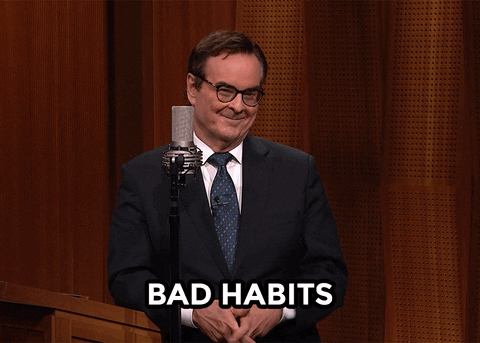10 Common Bad Money Habits and How to Change Them
Discover 10 of the most common bad money habits and how to go about making long term changes.

Introduction
How we spend money is a topic that is avoided by most people. Like mental health was for many decades, it is a taboo topic, but just like mental health it is something we all share. When thinking about our spending behaviour, we assume it means talking about the figures of how much we spend and how much we have. This feels too personal and invasive. Really, what we need to be talking about is our behaviour around spending money. The habits we have formed and how our mind processes our financial health.
How bad money habits are formed
New research from the University of Cambridge has shown that our lifelong money habits are formed by the age of 7. Let's say for example that you are an impulse spender who struggles to control themselves when they want to buy something. Odds are, this can be traced all the way back to your childhood. Perhaps you learned early on that materialism (owning nice stuff) was a strong indicator of your self worth. The fear of 'not being enough' if you don't buy something is what drives you to ignore other aspects of your financial security, such as saving.
The behaviours you witnessed from your parents or early lifestyle are deeply engrained and are most likely driving your money habits today. This is not to say that your habits and behaviour can't be changed, just that an awareness of why you are the way you are is a powerful first step on the journey to change. Having somebody to discuss this with is important, like a trusted friend or partner.
Your money habits are not all nature, nurture plays a big part.

Identifying bad money habits
Once you have taken the time to rethink through your formative years, it is time to discover your spending habits, and put in place strategies to make long term changes. Even the smallest changes could make big impacts over the long term. The thing about habits is that they are pretty much thoughtless by definition. It is something we do regularly without even really thinking about it. It becomes a part of life that is never questioned and leads us to hugely underestimate the impact it could be having on our finances. This means that very often you need to really be honest with yourself and have some awareness on the day to day to highlight these habits.
You can also spend an evening digging into your previous spending via your bank account:
- Download bank statements: Download 3 months worth of bank statements. Now go through them with highlighting pens. Use one colour for transactions that are more than weekly, one for weekly, and one for monthly. Afterwards go back through and focus on the weekly habits first, as this is likely where the biggest impacts can be made.
- Use an app: Most finance apps use Open Banking that allows you to instantly scan your bank account, saving a lot of time. Budgeting apps can help you categorise spend but it doesn't really allow for habit insights. Shameless plug, Rule Money specialises in financial habits 😊!
10 of the most common bad habits
We have tried to make it easy to identify your spending habits, by listing our some of the most common and giving some strategies for making changes.

- Daily Coffees
This is a really easy habit to fall into. Aside from our global caffiene addiction, it is a really nice routine that fits into other routines (making it easy). On your way to work, why not stop at one of the 1,000 coffee shops on the way to grab a quick cup of joe. Sure it is only £4 anyway. Well over a year you are talking potentially over £1k spend. Buy a keep cup, make your coffee at home. If the quality of coffee is important then invest in a coffee machine. This will pay for itself in no time. - Ordering takeaways
I am guilty of this one. I checked my annual takeaway spend on Rule and it was £2.5k. Literally a holidays worth. In thinking about it, my parents did, and still do order a lot of takeaways. Food was a way of feeling good when under pressure. I got into the habit of rewarding myself for something really good or bad with a takeout. Set yourself a strong rule around it. I said I would only have one once a week, and it saved me over a grand a year whilst not depriving myself. - Bottled Water
As a society we are always on the go, and need to take our water on the go with us. Buying bottled water is easy and convenient however with the prices now over £1/2 per bottle, it quickly adds up. Get yourself a reusable water bottle and fill up on the go. Tonnes of train stations and airports now have refill stations with filtered water for free. This could save you hundreds a year with a little forward thinking. - Unused subscriptions
Subscriptions are designed to be easy to take out and annoying to cancel. Free trials leading to monthly or annual costs quickly add up and very often we just totally forget about them. First do a recon mission and work out exactly what you are subscribed to. Then question if you use them. Do you really need Disney, Netflix, Prime Video and Paramount Plus? Cancel the ones you haven't used in a while and be ruthless. I promise you won't miss them. For any new subs where you are taking out a free trial, be religious about cancelling auto renewal. If you really use it, then you can always turn it back on if needs be. - Smoking
I smoked for years, and at roughly £4k per year and all the associated bad health outcomes it was an insane life choice. Stop smoking. There is a lot of support out there, and it is possible. - Taking Ubers
Anything that is convenient and more pleasant is an easy habit to fall into. Taking Ubers vs a sweaty train or heaven forbid walking is obviously more appealing. Problem is at roughly £10 a pop it adds up SUPER quickly. Try reducing it to only certain circumstances and stick to the rule. Maybe decide you will only take a taxi when it is raining, otherwise you will walk. The savings will quickly add up. - Gambling
The house always wins. Fact. Over a long enough timeline you will always lose. Habitual gambling may seem like fun and not a big deal but it is just burning money. The occasional flutter on certain games or events is ok for fun (provided you set a limit) but anything more than that is a really bad money habit to get into. If you feel you have an addiction to gambling it can be incredibly destructive, seek help and support ASAP. - Clothes shopping
This is one that is probably linked to self image and self worth. Buying clothes online via ASOS to keep up with trends is just an attempt to keep up with your peers or whatever you are consuming on social media or via advertising. Buy quality clothing that will last years, and ignore everything else. If you struggle with impulse control then set yourself some rules. Perhaps only one new item a month up to a certain value. Remove your payment cards from online browsers and where possible pay in cash - it hurts a lot more that way! - Buying groceries from express shops
Express or corner shops are way more expensive than supermarkets. It is easy to fall into the habit of buying the ingredients for one dinner at a time and popping into the shop maybe 4/5 times a week. Switch to weekly shops that are planned based on the meals you want. Write a list and stick to it. Pick a day you will do you weekly shop and consider doing it online to make it less of an effort. Shaving even 15-20% off your weekly food bill will be a huge saving over the course of a year. - Not having any money goals
Goals are what help us stay on track. If you are an impulse spender, it can be difficult to comprehend what the consequence is for spending the money in the moment. Goals can help us consider whether or not the purchase in the moment is more important that the future goal that it takes away from. Goals don't have to be big like your retirement, they can be micro too. Maybe you want to go on a weekend away and want to get £400 together for it. That might just be enough to curb that daily coffee.